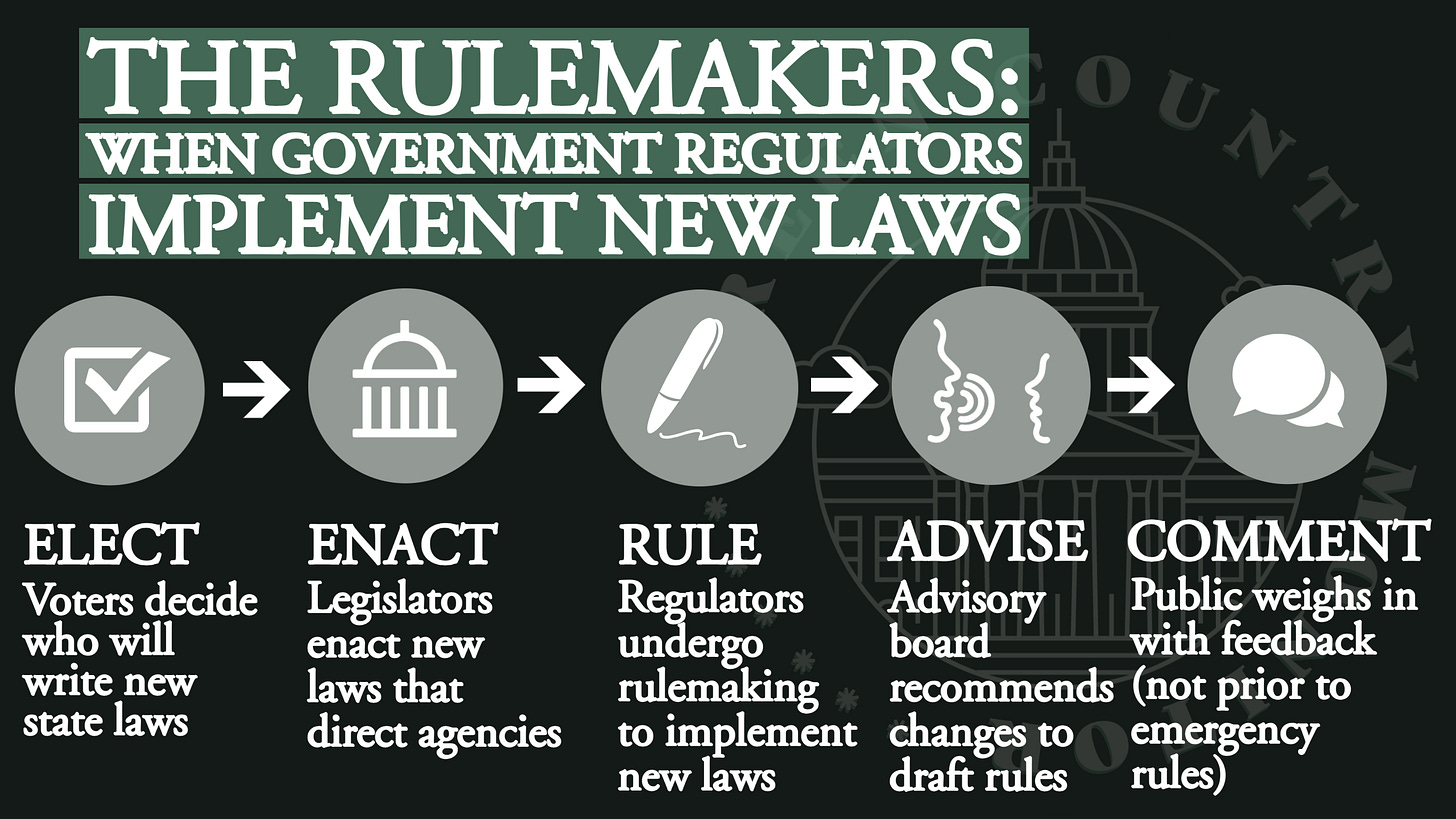Industry watches with worry as OK weed regulators rush to apply new laws
One of the hottest stories in Oklahoma cannabis took just hours to achieve that status -- 24 to be exact. With the 2021 legislative session now over, state cannabis regulators are speeding to write new agency rules and change others in some 100 pages of existing administrative edicts involving medical marijuana in the state.
The cannabis industry, experts, and advocates were given just one day to review the new rules before a lengthy meeting to discuss them last week.
Known as administrative rulemaking, the process occurs after elected lawmakers tell a government agency to do something specific or to promulgate rules for doing something specific. It’s also an opportunity for government regulators to enshrine in requirements their own wishes or preferences that go beyond directives made by the legislature in newly written laws.
The cannabis bills from this year’s legislative session have various deadlines for going into effect that range from soon after the governor’s signature to November later this year. When they go into effect depends on how urgently state legislators believe -- or claim -- the law is needed.
For any stakeholder in Oklahoma cannabis, what matters is knowing when new laws officially apply, how they’re being applied, and where they have the biggest chances of cutting into time and revenues or risking licensure. The public will have an opportunity to comment on the rules in the future. For now, the rules already have critics. The Oklahoma Cannabis Industry Association began detailing its own worries to members in an email last week.
They and others point to several rule revisions or additions that are either troublesome or involve new requirements that lawmakers are gravely serious about seeing enforced. Putting off any one of the new requirements or not making them a priority could quickly lead to your cannabis business license being revoked. Here are some highlights from the proposed rules:
Who pays for inventory tracking
The Oklahoma Medical Marijuana Authority insists that as a matter of agency rules, it won’t be paying for the industry to maintain compliance.
When tracking tags are unaccounted for
If radio-frequency tags affixed to plants and products are lost or misplaced, cannabis operators must report them as such in 48 hours.
Quantities that must be tagged
Each wholesale package requiring a tracking tag may be no bigger than 15 pounds of dry flower and 50 pounds of material for extraction. Everything within each package must come from the same harvest batch.
Proving you’re actively operational
Businesses will be required to prove that they’re operational within 180 days of a license being issued. The agency defines “working towards operational” below.
Disclosing foreign ownership
Operators must complete an affidavit revealing the existence of any foreign owners within 60 days of July 1 or risk license revocation.
More than just edibles
A key component in the rulemaking process for Oklahoma cannabis is an advisory board created when voters first authorized medical marijuana in 2018. It’s made up of experts, agency officials, and cannabis stakeholders, including from the industry.
It’s formally known as the OMMA Food Safety Standards Board, but that’s confusing, because its recommendations go far beyond just edibles. So to reduce that confusion, we’re going to call it the OMMA advisory board or the advisory board.
The board’s job is to formulate recommendations for how to ensure safety in the processing and handling of cannabis and cannabis products in the state of Oklahoma. Among its tasks is providing crucial input during the administrative rulemaking process.
Two new additions to the board are Blake Cantrell from Oklahoma City’s The Peak Dispensaries and Mike Ervin from Oklahoma Producers, which makes concentrate products. Both are also on the board of the Oklahoma Cannabis Industry Association and had one day to settle into their new positions and examine the proposed rules before June 16’s meeting. They still managed to critique the rules and ask questions in key areas where the outcomes could be felt statewide.
Lawmakers during the session weren’t always particularly helpful. Major bills affecting everyone in Oklahoma cannabis -- from patients to businesses -- were undergoing changes until literally the session’s final hours.
To illustrate just how confusing the legislature can be about its intent, consider the distance rule between schools and dispensaries, also known as a setback. Senate Bill 1033 and House Bill 2646 prescribe two different methods for determining the measurement, the difference of which could significantly alter location options for cannabis retailers.
Yet both were signed into law by the governor. Regulators in their draft rules are going with the second of the two to be signed, which happens to be the less-restrictive measurement contained in SB 1033.
Who pays for inventory tracking
Here, the agency asserts that the cost of Oklahoma’s program for tracking every cannabis plant and product will not be subsidized by the Oklahoma Medical Marijuana Authority or its parent agency, the Oklahoma Department of Health.
While the state’s cannabis laws require Oklahoma to have a tracking system for cannabis, they don’t require that the cost be borne by the industry, nor do they explicitly bar the state from using its swelling cannabis tax revenues to cover the cost of tracking cannabis for regulatory and enforcement purposes.
As worded, the state cannabis industry association believes the proposed rules lead to operators being required to use only Metrc tags and that OMMA is seeking to head off potential legal challenges to program mandates.
Board member Mike Ervin from Oklahoma Producers and the state cannabis association asked Williams to specify how the paragraph tied to a bill or directive from the legislator, and she was unable to fully do so. In other words, the language was coming from agency regulators and not lawmakers specifically.
Williams could only say that it more broadly stemmed from the legislature’s 2019 “Unity bill.” That’s when lawmakers, advocates, and others had to determine the how, what, when, where, and why of cannabis regulations in Oklahoma once voters had given their approval.
“It was the Unity bill that established seed-to-sale requirements, tracking requirements,” Williams said at the meeting. “Now that we know what that process looks like, we’re able to do rulemaking that reflects how we actually implement the laws that were put together prior.”
Ervin wasn’t satisfied.
“I guess I’m curious as to why it’s in this emergency rulemaking process from a bill two years ago. ... I guess I’m just curious as to why this language is even necessary.”
Williams: “For clarification.” After Ervin pressed further, Williams went on:
“As I said, now that we know more about what implementation of the system looks like, we’re able to better articulate what those requirements are. Without knowing the nuances of the systems and how to implement that legislation, we weren’t able to write rules specifically to implement that process, because we didn’t know what all that process entailed at that time.”
Board member Blake Cantrell from The Peak Dispensaries said that he and many in the industry never assumed the cost of seed-to-sale would be shouldered by the state. But mandating the use of the state’s contractor “financially marries us to the whims of Metrc and their balance sheet, effectively. … The mandate to utilize on Metrc’s terms is a very important distinction.”
The Unity bill generally required that cannabis businesses use a seed-to-sale tracking system. It could either be the one used by state regulators for their own quality-and-safety purposes. Or they could use a system of their own choosing, as long as it effectively integrated with what Oklahoma had chosen to achieve its goals.
Eighteen months after the bill’s passage, Florida-based Metrc became the company Oklahoma cannabis regulators selected to meet their own mandate from the legislature. The plan called for licensees to pay Metrc $40 per month in subscription fees, plus $0.45 for each cannabis plant and $0.25 for each cannabis product.
But the Unity bill had stopped short of saying cannabis licensees can only achieve compliance by fully adopting the system Oklahoma chose for itself, in this case Metrc. It does not require that the cannabis industry absorb the cost of the program, nor does it call upon the agency to declare a prohibition on the use of cannabis tax revenues or any other revenue source for covering the program’s price tag.
Neighboring Missouri, for example, has a fixed-price contract with Metrc in which the cost of the tracking tags is included and the company is unable to separately charge for them (although it tried and lost in court). Board member Ervin pointed out that using public dollars to subsidize the compliance requirements would likely already require permission from the legislator. So a declaration from the agency that it unequivocally won’t pay seems altogether unnecessary.
When tracking tags are unaccounted for
Under the proposed rules, when cannabis operators are “unable to account for” lost or misplaced tracking tags, they must be reported within 48 hours.
“We were going to say ‘lost,’ but then what accounts for ‘lost’?” said Williams at the meeting. “Did I just put it in the wrong room, etc, etc? You’ve got two days to figure it out, or you’ve got to report it.”
Large outdoor growers with tens of thousands of plants worry this rule may simply not be practical where Oklahoma’s unpredictable weather could tear one or innumerable tags away. Following a ripper of a plains storm, a cultivator could quickly fall into violation by being unable to account for all of the missing tags within the required 48 hours.

Ervin said Oklahoma’s agricultural history made it distinct from other states with legal cannabis and seed-to-sale tracking requirements. Given how the state stands apart, Ervin wondered if Oklahoma should completely revisit its approach to meeting the Unity bill’s requirements.
“We’re much more of an agricultural state,” Ervin said, “and there are many growers that grow outdoors. … You know the weather in Oklahoma. We all live here. It rains. It’s hot. It’s cold. It snows in October. … If you have 50,000 plants, 100,000 plants scattered across 30, 40, 50 acres, how do you even know if these have fallen off [or] if they’re even working?”
Williams responded that she understood the concerns and had heard them from cultivators already. Her challenge remained balancing those interests with the agency’s obligation to shield patients from unsafe cannabis, and Williams said she was unsure of how to do that without the tracking information contained in the unique tags.
The quantities that must be tagged
Elsewhere in the proposed rules, the agency instructs that each package being sold for wholesale rather than retail must have a radio-frequency tag affixed to it during transfer and storage. Everything within the package must come from the same harvest batch.
Under House Bill 2646 passed this year, which goes into effect Nov. 1, “harvest batch” is defined as every 50 pounds of cannabis material an operator plans to dedicate to extracts and every 15 pounds of dry flower.
The state cannabis association calls these numbers for determining what quantities must be tagged “arbitrary” and says they’d apply even where a large-scale grower planned to dedicate most of his or her crop to extraction. Having to add a new tag for every legally defined harvest batch could needlessly push up costs without a clear trade-off of improved public safety.
The association also noticed that the rules as proposed would require the industry to use the medical marijuana authority’s chosen Metrc tracking system to generate manifests when cannabis and cannabis products are transported. Statutes, OCIA points out, do not require that Metrc be used for generating transport manifests (state officials believe they do).
Proving you’re actively operational
Cannabis businesses after Sept. 1 of this year must prove to be operational or working toward it within 180 days of their license being issued under House Bill 2272. State regulators will conduct inspections to verify that a business is actively operating and not merely a shell for passing through illegal product.
If a new licensee flunks the site visit, they’ll be granted a grace period of another 180 days. Flunk again, and the agency can choose whether to give you additional time or move to revoke your license. Under the draft rules, working towards active operation would mean you are:
Onboarding and training initial staff
Performing construction or making other material changes to a premises
Applying for permits and licenses other than those required by OMMA
Awaiting or in the process of purchasing tools, equipment, or materials
Anything else the agency decides should be needed
Disclosing foreign ownership
This requirement comes directly from the demands of lawmakers, specifically House Bill 2272.
Don’t doubt that lawmakers fully intend to brandish it to constituents as evidence that Oklahoma is mindful of international or criminal organizations overtaking the state through its radically tolerant cannabis laws. Because it will be brandished in such a way is why cannabis operators should take it seriously.
Within 60 days of July 1, all cannabis-business licensees must complete an affidavit confirming or denying whether they have foreign investors or owners. Lawmakers in their wisdom did not define “foreign.” The law also does not go so far as to say foreign ownership is prohibited or even that it would prompt deeper scrutiny from state officials. But not completing the requirement or lying on the affidavit could nonetheless lead to serious trouble.
Ironically, in Senate Bill 1033 during the session, legislators made it perfectly legal for an Oklahoma cannabis business to be 40 percent-owned by a publicly traded company, even if it’s from Canada. No clear reason is given for why the state shouldn’t go ahead and allow any number of additional countries around the world to invest in Oklahoma cannabis the way they do in other of the state’s industries every day.
“It’s a benefit for the state of Oklahoma to have outside investors who want to bring money into Oklahoma in the form of purchasing cannabis businesses,” said board member Blake Cantrell. “It’s puzzling to me that there would be this framework that sets seemingly arbitrary percentages and eliminates every country in the world but the U.S. and Canada.”
Listening to: Slayer “War Ensemble” Reply with an email or sign up to receive alerts. Follow Green Country Monitor on Twitter, Facebook, LinkedIn, and Instagram. If you appreciate this work, consider leaving a tip.





